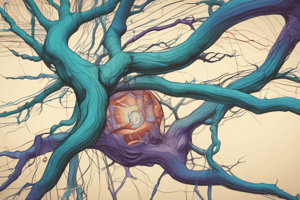Podcast
Questions and Answers
What is the main function of neurotransmitters?
What is the main function of neurotransmitters?
- Regulating heart rate and digestion
- Breaking down and reusing neurotransmitters
- Forming proteins in the body
- Conveying signals from a neuron to a target cell across a synapse (correct)
Which of the following is an example of a monoamine neurotransmitter?
Which of the following is an example of a monoamine neurotransmitter?
- Glutamate
- Glycine
- Serotonin (correct)
- Nitric oxide
In the neurotransmitter process, what happens during the step of 'Binding'?
In the neurotransmitter process, what happens during the step of 'Binding'?
- Neurotransmitter diffuses across synaptic cleft
- Inhibits or releases; binds to postsynaptic receptors (correct)
- Neurotransmitter is broken down or reused
- Neurotransmitter is stored in vesicles
Which neurotransmitter is both excitatory and inhibitory?
Which neurotransmitter is both excitatory and inhibitory?
What is the function of muscarinic Ach receptors?
What is the function of muscarinic Ach receptors?
What distinguishes neuromodulators from neurotransmitters?
What distinguishes neuromodulators from neurotransmitters?
What is the main difference between neurotransmitters and neuromodulators?
What is the main difference between neurotransmitters and neuromodulators?
Which type of ligand competes with the endogenous ligand for the same binding site on a receptor molecule?
Which type of ligand competes with the endogenous ligand for the same binding site on a receptor molecule?
What type of substance alters the response to an endogenous ligand?
What type of substance alters the response to an endogenous ligand?
Which type of ligand binds to a receptor and does not activate it, preventing binding by other ligands?
Which type of ligand binds to a receptor and does not activate it, preventing binding by other ligands?
What is the main characteristic of an inverse agonist?
What is the main characteristic of an inverse agonist?
What is the effect of an agonist on a receptor?
What is the effect of an agonist on a receptor?
Flashcards are hidden until you start studying




